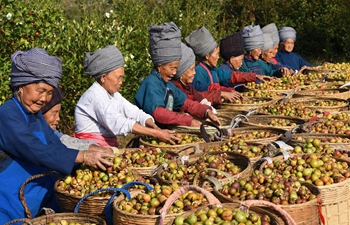by Lillian Banda
LUSAKA, Oct. 28 (Xinhua) -- While recycling is still a relatively new phenomenon, collecting recyclable waste materials is slowly and steadily becoming a lucrative undertaking in a number of towns in Zambia.
Individuals from lower income communities are taking advantage of opportunities presented by the presence of garbage, which is often indiscriminately disposed of because of lack of proper waste management systems.
They are doing this by collecting recyclable materials, which are later sold to manufacturing companies.
Much of the recyclable materials collected include a wide range of products made of plastic, paper and aluminum.
"I earn about K200 (about 20 U.S. dollars) everyday just from collecting used plastic food carrier bags," says Samson Banda, 22, a resident of Lusaka, the country's capital.
Banda dropped out of school because his parents could not afford to provide for his educational needs.
"Not only am I now able to afford to rent a house and have decent meals but I have also saved some monies to help kick start my own business enterprise," he added.
He told Xinhua in an interview that he has been involved in the recyclable waste business for about a year and that he plans to stop once he has saved enough money.
And Matthews Mwape, a recyclable waste aggregator based in the Zambian capital notes that the recycling business is not only helping to bring disadvantaged communities and households out of lack and despair but also promoting environmental protection awareness among the general population.
Mwape, who started off as a recyclable waste collector, explains that many youth are benefiting from collecting recyclable waste materials which has helped in lifting their lives and their communities out of extreme poverty.
"As a result, the number of criminal activities has reduced and those that are financially empowered through recycling are helping to shape their individual communities in a positive way," observes Mwape.
He also reveals that he has contracted 13 people, five of whom are women to help with the sorting out of the waste supplied by over 400 individuals from different parts of the Lusaka.
Mwape urged young people to take advantage of opportunities currently existing in the recycling business to empower themselves financially.
"I am proud to be among those that are not only seeking to better their lives but also helping to protect the environment," says Mary Mwansa, one of Mwape's contracted workers.
Mwansa, 26, says she considers her job like any other job as long as she is able to earn a living.
Meanwhile, Global Green and Clean Environment (GGCE), a local organization, says it is about time governments started to look for unconventional ways of creating job opportunities for the majority of the country's many populations that are out of employment, particularly the youth.
GGCE notes that there is need to invest in programs and policies that encourage populations to be enterprising and less dependent on the government.
"Recycling is a booming business in Zambia that needs extensive support because it can help to boost the manufacturing sector and increase employment opportunities," Brian Bwalya, the organization's executive director said.
He is however quick to caution those already involved in recycling to invest in education and sensitization programs about the handling and management of waste.
"Let us ensure that education and sensitization programs particularly for recyclable waste collectors are prioritized. Their health should always come first and they should be advised to wear the right gear," he said.
According to him, laws pertaining to the environment and recycling should be followed so that issues of environmental protection and human health are respected.













